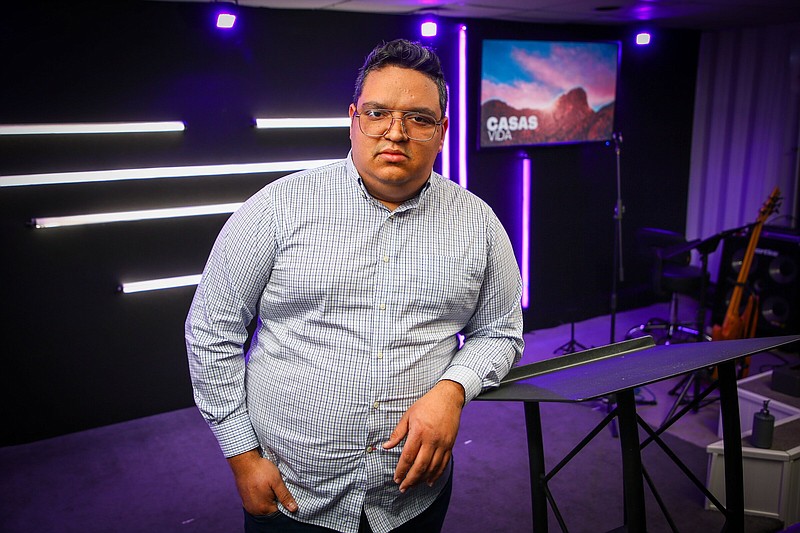TAMPA, Fla. -- For over four years, Andrés Arenas has been serving as a spiritual leader and musical director at Iglesia Vida Nueva, a Pentecostal church in West Tampa, where the congregation mainly consists of families from Latin America.
In 2019, Arenas came from Bucaramanga, in north-central Colombia, accompanied by his wife, to support this church and contribute to its growth. Attendees gather three times a week to pray, raise their voices in songs of praise and share stories of faith. Arenas also manages a group of around 50 church members who live in Zephyrhills, Fla., and hold smaller prayer gatherings in private homes.
"We're like a big family," said Arenas, 27. "That's the most important thing."
But Arenas isn't sure how much longer he can continue with the congregation.
His R-1 visa, which is granted to foreign-born religious workers for up to five years, is set to expire in December. Two years ago he applied to obtain a permanent residency, but his request has not been processed as he expected.
That's because of a backlog in permanent residency applications. The approval process for applications for people who already have visas under the category known as Employment-Based Fourth Preference (EB-4) used to take about 18 months. The government grants 10,000 green cards annually for the EB-4 category, which includes foreign-born religious workers, former U.S. government employees, translators and certain broadcasters, among others.
But some petitions that were filed as early as January 2019 are still awaiting approval, and the wait list can now take years, according to the Evangelical Immigration Table, a coalition of evangelical denominations and organizations that advocates for immigration reform.
That's at least in part because last year, immigration authorities added another group of immigrants to the EB-4 category -- minors from Guatemala, El Salvador and Honduras who are listed as "special immigrant juveniles" because they were abandoned, abused or neglected by a parent.
"Both Congress and the State Department should act now to reduce the unnecessarily lengthy backlogs in visa processing," said Galen Carey, vice president of government relations with the National Association of Evangelicals. He said it's tragic when spiritual leaders serving in churches and communities have to leave the country and abandon their ministries due to "bureaucratic delays."
"For years we have sent missionaries abroad to plant churches; now many of those churches are reciprocating by sending workers to help us," Carey said.
Religious workers are not the only ones affected by delays. According to the Cato Institute, a Washington-based libertarian think tank, the employment-based green card backlog reached a new record of 1.8 million cases in 2023.
It's causing some churches to rethink plans to recruit faith leaders from abroad.
That includes pastor David Cantillo, the leader of Iglesia Tampa Bay Para Cristo.
"There are too many issues in the process, and they take too long," Cantillo said.
If nothing changes, Arenas, his wife and their 3-year-old daughter, who was born in the United States, must return to Colombia and stay there for at least a year, leaving the congregation of over 300 behind. After a year, he might be eligible to renew his visa and return to the U.S. along with his family.
Experts said that as many as 33,000 religious workers are in the queue for permanent legal status, with around 25% of those from Latin America, according to estimates based on the State Department's records. A year ago, more than 100,000 minors with the "special immigrant juvenile" status were waiting to obtain green cards, according to a report by the National Immigration Project and Tulane Law's Immigrant Rights Clinic.
Omar Angel Perez, immigrant justice director at Faith in Action, a nonprofit that works with immigrants and minority communities, said the backlog is a symptom of a broken system that "devalues humanity."
"It's past time for congressional leaders to fix it so that people like foreign-born religious workers who are an invaluable piece of the fabric of our society are not stuck in an unstable situation," Perez said.
Arenas still hopes for good news to come before the end of the year. He doesn't want to disappoint his community and friends, he said, who are unaware of his legal problems. Only the church leaders are informed about the situation but they feel powerless to do much about it, Arenas said.
Two years ago, he and his wife, Ana, 23, bought a house in Zephyrhills, thinking they were setting themselves up for a promising future. But now thinking about the future makes him anxious, he said.
"My work and my life are in America," said Arenas. "I don't know what to do. But we have faith -- a lot of faith."

